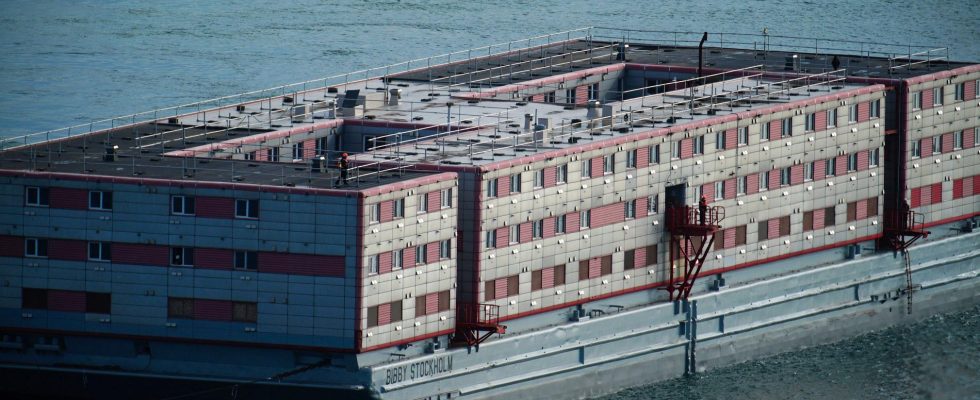full screen
Next
The barge Bibby Stockholm when it arrived at the port of Portland in southwest England on July 18.
1 / 2Photo: Ben Birchall/AP/TT
Hundreds of boat refugees are to be housed on a barge as Britain overhauls its asylum policy. The decision arouses opposition from both local residents and human rights groups.
In the long term, the government also hopes to move migrants abroad.
“Bibby Stockholm can accommodate up to 222 guests in high-quality rooms with private bathrooms.” This is how the company that rents out the barge describes its cabins in an advertising leaflet.
However, the British government has decided to house more than twice as many, roughly 500 asylum seekers, in the floating accommodation. The single beds have therefore been replaced by bunk beds.
The stated aim is to reduce asylum accommodation costs by relocating some of the approximately 51,000 people who are currently housed in hotels around the UK while waiting for their asylum cases to be heard. New accommodation is also underway in former military buildings and the goal is to be able to move around 3,000 more people this autumn, according to the Ministry of the Interior.
“Floating Prison”
Bibby Stockholm, which was previously hired as temporary workplace accommodation for wind turbine construction in Piteå in 2018, entered the port of Portland in southwest England the other week. But there was no warm welcome. The barge was met with protests – from two different camps.
“No floating prisons”, read one of the placards from asylum rights activists who gathered outside the harbor and who are critical both of the conditions that will prevail in the accommodation and of the government’s restrictive refugee policy. Concerns have been raised, among other things, about fire safety on the barge due to its narrow corridors and that the single-person cabins will now accommodate two people.
“No to the barge” was also the message from the other group of protesters. However, their concern concerns the arrival of the asylum seekers on the Portland peninsula, with about 12,000 inhabitants.
– I wouldn’t go out on my own when they get here, said one protester to The Guardian.
Re-debated team package
The barge must lie in the harbor for at least 18 months. According to the plan, a first group of 50 men will be moved to the accommodation on Tuesday. It’s about asylum seekers who came to the UK from France across the English Channel – a group that has found itself at the center of an increasingly heated migration policy debate in the UK.
In 2022, around 45,000 people made the risky journey in small, often overcrowded, boats.
The Conservative government has promised to stop boat trips across the channel through a deterrent policy. Recently, a long-debated package of laws was hammered through, giving the authorities the right to immediately detain those who arrive illegally by boat, and deport them to their home countries or to a “safe” third country.
Criticized by the UN
The plan to send asylum seekers to Rwanda was stopped earlier this summer by a British court citing flaws in Rwanda’s asylum system. However, the government hopes to be able to appeal the decision in the Supreme Court.
The new laws are against international law, according to the UN refugee agency UNHCR, which points out that they mean many migrants will be denied the right to seek asylum in the UK.
At least 60 percent of those who came in boats across the English Channel last year have fled war-torn areas or oppressive regimes and have refugee reasons in Britain, according to an analysis by the organization Refugee Council, which provides support to refugees. The organization points out that most people lacked the opportunity for legal and safe refugee entry routes.
THE FACTS Great Britain’s new migration law
The Illegal Migration Bill was presented in March and after many rounds was finally voted through in a final step in the House of Commons of the British Parliament on 20 July.
People who come to the UK illegally must be detained and deported to their home country or to a so-called “safe” third country. The Minister of the Interior is obliged by law to ensure that this is complied with.
Those who are arrested and deported are not given the opportunity to have their asylum claims tried in the UK and are banned from returning to the country. If they cannot be sent back to their home countries, their grounds for asylum must be tried in a third country. The British government has reached an agreement with Rwanda to send migrants there. The plan has been ruled out by a British court, but the government hopes to appeal the decision to the Supreme Court.
The government describes the basic idea behind the Illegal Migration Bill as follows: “If people know there is no chance for them to stay in the UK then they will not risk their lives and pay criminals thousands of pounds to bring them here.”
Source: gov.uk
Read more
